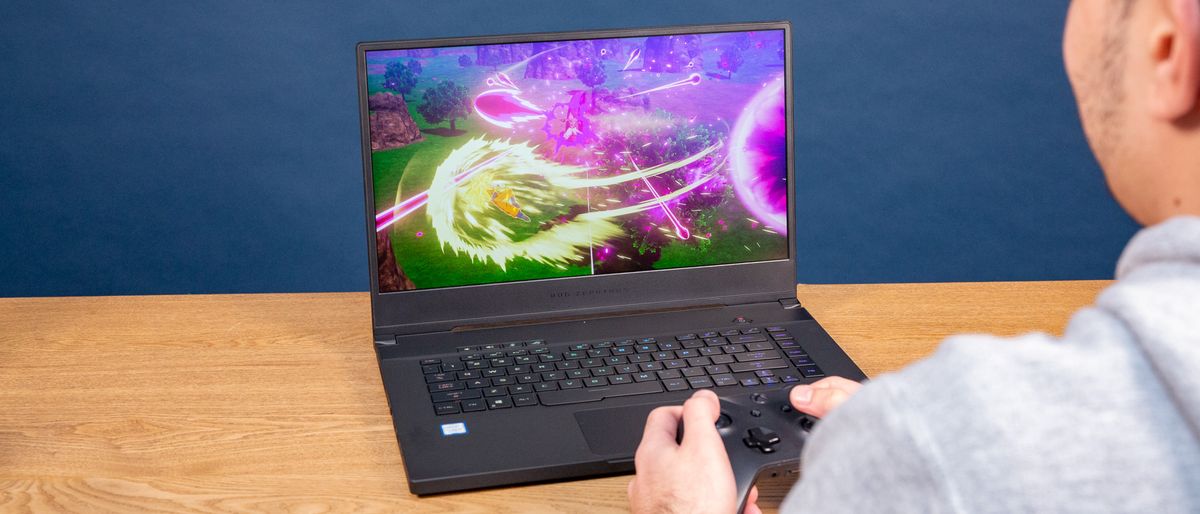Laptop Mag Verdict
Asus’ ROG Zephyrus S GX502 boasts a 240Hz panel, a clicky keyboard and good battery life, but the performance could be better.
Pros
- +
Sleek design
- +
Smooth 240-Hz panel
- +
Clicky keyboard
- +
Good battery life
- +
Solid speakers
Cons
- -
Display should be brighter, more colorful
- -
Performance and graphics could be better
Why you can trust Laptop Mag
Asus’ latest ROG Zephyrus S GX502 is here, with quite a few improvements over its predecessors.
For $2,199, the new Zephyrus S sports the same sleek design, now with a smooth 15.6-inch, 240Hz panel; a clicky keyboard in a more comfortable position; a solid pair of speakers and good battery life.
However, the laptop trips up with its dim display and slightly underwhelming performance from its 9th Gen Intel Core i7 CPU and Nvidia GeForce RTX 2070 Max-Q GPU. The GX502 doesn’t cut it as the best gaming laptop, but overall, it's a solid gaming machine, thanks to its numerous reliable features.
Asus ROG Zephyrus S GX502 price and configuration options
I tested the Asus ROG Zephyrus S GX502GW, which costs $2,199 and comes with an Intel Core i7-9750H processor, an Nvidia GeForce RTX 2070 GPU with 8GB of VRAM, 16GB of RAM, a 1TB SSD and a 240Hz, 1080p display.
Price: $2,199
CPU: Intel Core i7-9750H
GPU: Nvidia GeForce RTX 2070 GPU with 8GB of VRAM
RAM: 16GB
Storage: 1TB SSD
Display: 15.6-inch, 1920 x 1080, 240Hz
Battery: 5:47
Size: 14.2 x 9.9 x 0.7 inches
Weight: 5.11 pounds
The base model is the Zephyrus S GX502GV, which runs $1,899 and is outfitted with the same CPU and RAM, but drops to an RTX 2060 with 6GB of VRAM, a 512GB SSD and a 144Hz, 1080p display.
If this isn’t your speed, check out our top cheap gaming laptops under $1,000 page or our best video editing laptops page.
Asus ROG Zephyrus S GX502 design
The exterior of the Zephyrus S hasn’t changed much, as it sports a black, brushed aluminum hood accompanied by an RGB-lit ROG logo on the right side. On the hinge is a sleek cutout, revealing LED-lit indicators and an engraved Republic of Gamers logo.

There’s a significant change on the inside; Asus switched from a forward keyboard format to a normal one, with the touchpad just below the keyboard (normalcy is so nice). Not only that, but the entire frame is made out of magnesium alloy instead of aluminum. Most of the deck is matte-black, and above the keyboard is a micro-dotted panel. Like the previous Zephyrus laptops, the underside opens when the lid is lifted, to allow for additional airflow.
At 5.1 pounds and 14.2 x 9.9 x 0.7 inches, the Asus ROG Zephyrus S GX502 is a relatively slim 15-inch laptop, but it’s on the heavier side. The Razer Blade 15 (2019) (4.7 pounds, 14 x 9.3 x 0.7 inches), Gigabyte Aero 15 Classic (4.6 pounds, 14.0 x 9.8 x 0.7 inches) and Lenovo Legion Y740 (4.97 pounds, 14.2 x 10.5 x 0.9 inches) are significantly lighter.
Asus ROG Zephyrus S GX502 ports
The Zephyrus S has a decent number of ports, but it doesn’t feature a Mini DisplayPort, which means you’ll need an adapter if you’re going to use a VR headset.

On the left side, there’s the power jack, an RJ45 Ethernet port, an HDMI 2.0B port, one USB 3.1 port, a microphone jack and a headphone jack. Meanwhile, the right holds room for a Kensington lock slot, two USB 3.1 ports and one USB Type-C DisplayPort 1.4.

If you need more ports, check out our best USB Type-C hubs and best laptop docking stations pages.
Asus ROG Zephyrus S GX502 display
While the Zephyrus S’ 15.6-inch, 1920 x 1080-resolution panel boasts a 240Hz refresh rate with a 3 millisecond response time and Nvidia G-Sync, the screen itself is relatively dim and doesn’t pop as much as your average gaming laptops do.

In the Morbius trailer, the mist surrounding the titular character glowed a comic-book style purple color, but it wasn’t very vivid. When Morbius was locked up in a glass prison, it was difficult to make out the corners of the dimly-lit room. The display was sharp enough to pick up the sharp ends of Jared Leto’s beard.
Baranor’s green chestplate and cloak mixed with copper accents caught my eye while jumping around and slicing through fools in Middle-earth: Shadow of War. The rock formations in the caves I was raiding weren’t as detailed as I would’ve liked, as it was a little too dark. However, I immediately noticed the benefit of the 240Hz refresh rate when I cranked the graphics down and gave the combat a whirl. My sword slices, hammer swings and bow attacks were so smooth that I felt like I was Celebrimbor’s mind in Baranor’s body.
According to our colorimeter, the Zephyrus S’ screen managed to cover only 109% of the sRGB color gamut, which is far below the 148% premium gaming laptop average. The Razer Blade 15 (149%), Aero 15 Classic (117%) and Legion Y740 (112%) all had better scores.
At 249 nits, the Zephyrus S is one of the dimmest gaming laptops around, falling short of the 318-nit category average. It managed to surpass the Aero 15 Classic’s 246 nits, but that’s not saying much. Meanwhile, the Razer Blade 15 (262 nits) and the Legion Y740 (267 nits) also fell below average.
To be clear, if you’re paying over $2,000 for a gaming laptop, we expect screens with at least 300 nits of brightness and 130% sRGB, and those numbers don’t even beat the category averages.
Asus ROG Zephyrus S GX502 keyboard and touchpad
You have no idea how pleased I am that the Zephyrus S’ keyboard is finally in a traditional position. Not only that, but the keys don’t feel shallow or cheap: Each key is satisfyingly clicky and backed by its very own RGB lighting.

You can configure the RGB lights in the Aura Sync tab of the Armoury Crate app, which will offer you preset effects like Rainbow or Breathing. If you want to customize the lighting yourself, you have to download a separate app called Aura Creator from the Microsoft Store. However, customizing your lighting through that app proved to be overly complicated, as it functioned more like video-editing software than anything else.
I nailed 80 words per minute on the 10fastfingers.com typing test, speeding past my typical 70-wpm average. The keys' travel isn’t too deep, but they still require a bit of heft to register the click.
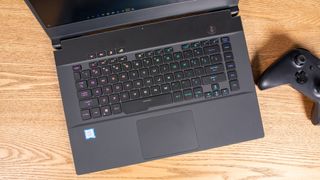
The 4.1 x 2.8-inch touchpad isn’t as smooth as I’d like it, but it had a decent click and registered Windows 10 gestures, like two-finger scrolling and three-finger tabbing, just fine thanks to its Precision drivers.
Asus ROG Zephyrus S GX502 audio
The Zephyrus S’ bottom-firing speakers were surprisingly decent, and loud enough to fill my living room with sound. I listened to Maroon 5’s “Memories,” and the opening guitar was as hypnotic as I remembered; the song topped off with Adam Levine’s melodic voice followed by the lovely backup vocals.
In Middle-earth: Shadow of War, I severed Horza the Watcher’s arm twice, in separate positions, which sounded like two sharp, clean slices that made me audibly "oooo." The thick thud of Celebrimbor’s hammer slamming against an orc’s skull was oh, so satisfying. When the orcs were trash talking me, their voices were disgustingly crisp and clear. However, the fans on the Zephyrus S were a little overwhelming and didn’t mix well with the audio.
Asus includes Sonic Studio III audio app, which gives you presets for Music, Movie, Gaming and Communication. I found Music worked best for both music and gaming, while the Gaming preset sounded hollow while playing Shadow of War. Within each preset, there are adjustable settings for Smart Volume, Voice Clarity, Bass Boost, Treble Boost, Reverb and Upmix/Surround. You can also apply different presets to specific apps, so that you don’t have to adjust your audio whether switching from music, gaming or movies.
Asus ROG Zephyrus S GX502 gaming, graphics and VR
Underneath the Zephyrus S’ hood is an Nvidia GeForce RTX 2070 Max-Q GPU with 8GB of VRAM. The graphics card averaged 78 frames per second as I dodged and sliced my way through a small army of orcs in Shadow of War at Ultra, 1080p settings. However, the performance could be better.
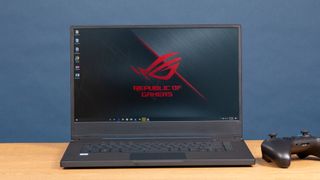
On the Rise of the Tomb Raider benchmark (Very High, 1080p), the Zephyrus S scored 50 fps, which not only fell short of the 65-fps premium gaming laptop average, but also the averages accrued by the RTX 2070 GPUs in the Razer Blade 15 (60 fps), Aero 15 Classic (55 fps) and Legion Y740 (66 fps).
The Zephyrus S averaged 69 fps on the Hitman benchmark (Ultra, 1080p), which put it far behind the category average (108 fps). Although the Razer Blade 15 (96 fps), the Aero 15 Classic (98 fps) and the Legion Y740 (96 fps) didn’t make the average either, they were all significantly closer to it.
On the Grand Theft Auto V benchmark (Very High, 1080p), the Zephyrus S was slightly more competitive, at 75 fps, which matched the Aero 15 Classic and beat the Legion Y740 (67 fps). However, it just missed the Razer Blade 15 (76 fps) and still fell short of the premium gaming laptop average (79 fps).
As previously mentioned, the Zephyrus S hit 78 fps on the Shadow of War benchmark. However, it stumbled against the Razer Blade 15 (91 fps), the Aero 15 Classic (85 fps) and Legion Y740 (87 fps), not to mention the category average (97 fps).
Asus ROG Zephyrus S GX502 performance
The Zephyrus S' Intel Core i7-9750H processor with 16GB of RAM was capable of juggling 40 Google Chrome tabs and five 1080p YouTube videos while Middle-earth: Shadow of War was running in the background. However, similar to its graphics performance, the CPU performance could be better.
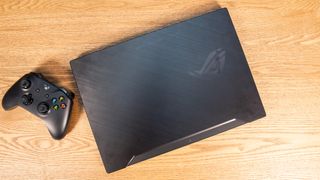
On the Geekbench 4.1 overall performance test, the Zephyrus S scored 19,504, falling short of the premium gaming laptop average (24,687). With the same CPU, the Razer Blade 15 hit 22,379, while the last-gen CPU (Core i7-8750H) in the Aero 15 Classic and Legion Y740 got 23,516 and 21,629, respectively.
The Zephyrus S managed to transcode a 4K video to 1080p in 12 minutes and 44 seconds on our HandBrake benchmark, sliding past the Razer Blade 15 (12:53). However, both were outshined by the Aero 15 Classic (10:04) and Legion Y740 (9:23) as well as the category average (9:28).
Asus’ 1TB SSD copied 4.97GB of data in 7 seconds, translating to a transfer rate of 727 megabytes per second, which matched the Aero 15 Classic’s 512GB SSD and is basically on top of the premium gaming laptop average (793 MBps). The Razer Blade 15’s 512GB SSD and the Legion Y740’s 256GB SSD managed 636 MBps and 566 MBps, respectively.
Asus ROG Zephyrus S GX502 battery life
What the Zephyrus S sacrifices in performance, it gains in battery life. After continuously surfing the web over Wi-Fi at 150 nits of brightness, the Zephyrus S’ battery lasted 5 hours and 47 minutes, toppling the 3:30 premium gaming laptop average. However, the Razer Blade 15 and Aero 15 Classic had better performance in most areas, and their batteries lasted 5:02 and 6:58, respectively. Meanwhile, the Legion Y740’s battery crumbled, at 2:16.
Asus ROG Zephyrus S GX502 webcam
As you might have noticed from the photos, there’s no webcam to be found on the Zephyrus S. If you need one, we recommend looking at our best external webcams page.
Asus ROG Zephyrus S GX502 heat
Thanks to Asus’ Active Aerodynamic System, which is a fancy term for the underside lifting up to provide more air flow, the Zephyrus S has a manageable cooling solution.
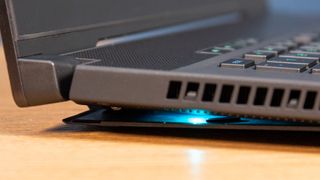
I played Dragon Ball Z: Kakarot for 15 minutes, and the underside hit 108 degrees Fahrenheit, which is slightly above our 95-degree comfort threshold. The center of the keyboard and touchpad measured 115 and 83 degrees, respectively. However, the hottest the machine got was 132 degrees on the micro-dot panel above the keyboard. There’s no reason your hand should be up there, so it’s perfectly fine. Moreover, even when I touched it, it felt only warm, not scalding hot. Overall, it was comfortable to use in my lap.
On the normal heat test, steaming a 1080p video for 15 minutes, the underside reached 88 degrees, while the keyboard hit 91 degrees and the touchpad registered a low 77 degrees. Once again, the hottest spot was above the keyboard, at 94 degrees.
Asus ROG Zephyrus S GX502 software and warranty
Asus outfits its Zephyrus laptops with the Armoury Crate, which allows you to increase the performance of the CPU, GPU and fans. You can also customize the keyboard lighting, curate a game library of games aggregated from other launchers, and create profiles for performance and lighting based on what you’re playing or doing.
There’s also the GameVisual app, which can adjust the color of your display, and the GameFirst V app, which can monitor and limit your network bandwidth for certain apps. Finally, there’s the MyAsus app, which can run system diagnostics and hardware checks on your system to make sure everything runs well.
Of course, there’s Windows 10 bloatware as well, like Candy Crush Saga, Gardenscapes and Asphalt Street Storm Racing.
The ROG Zephyrus S GX502 comes with a one-year limited warranty. See how Asus performed on our Tech Support Showdown, Best and Worst Laptop Brands and Best and Worst Gaming Laptop Brands ranking.
Bottom line
The Asus ROG Zephyrus S GX502 boasts quite a few great features, and improved in a lot of ways, especially concerning its keyboard, battery life and speakers. It also sports a new 240Hz panel packed in the same sleek design. However, its dim screen and middling performance make it a hard sell at $2,199.
If you’re already spending more than $2,000, you might as well spring for the Gigabyte Aero 15 Classic, which is currently on sale for $2,299. This laptop boasts similar specs (minus its 512GB SSD) but offers stronger overall performance, longer battery life and a lighter chassis.
But, if you’re not focused hardcore on performance, then the Zephyrus S is an overall solid gaming laptop to buy.

Rami Tabari is an Editor for Laptop Mag. He reviews every shape and form of a laptop as well as all sorts of cool tech. You can find him sitting at his desk surrounded by a hoarder's dream of laptops, and when he navigates his way out to civilization, you can catch him watching really bad anime or playing some kind of painfully difficult game. He’s the best at every game and he just doesn’t lose. That’s why you’ll occasionally catch his byline attached to the latest Souls-like challenge.
